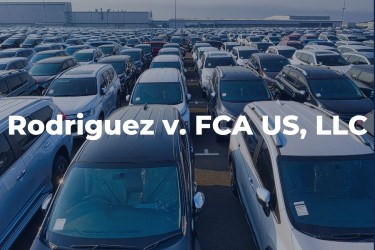
Buying a car in California is an exciting experience. However, buying a used car can put buyers on an emotional and financial rollercoaster if they are not careful.
Historically, a manufacturer’s warranty on the vehicle protected used car buyers with remedies pursuant to the Song Beverly Consumer Warranty Act, aka the California Lemon Law. Where consumer experienced repeat warranty repairs with a used vehicle purchase, the California’s lemon law could help protect you. Unfortunately, a new lawsuit in California may be changing all that.
In this article, the Lemon Law Experts will walk you through the ruling in the recent Rodriguez v. FCA US, LLC matter. We’ll help you understand how this new case could impact your used car rights in California. We’ll also tell you what to watch out for when buying a used car.
For immediate assistance, please don’t hesitate to call (877) 885-5366 or reach us online today for a free consultation.
Will the Rodriguez v. FCA US, LLC Case Change Used Car Buying?
The Facts of the Rodriguez Case
In the Rodriguez case, the plaintiffs purchased a Dodge truck with approximately 55,000 miles on it from a used car dealership. While the manufacturer’s basic warranty had expired, the truck still had a limited powertrain warranty that was in effect. Following the plaintiffs’ purchase of the truck, the vehicle experienced major defects.
The plaintiffs sued FCA US, LLC claiming that they were owed either a new vehicle or a refund of the purchase price of their truck under California’s lemon law. However, this remedy is only available if the car is sold with a “manufacturer’s new car warranty.” If a vehicle under warranty cannot be repaired after a reasonable number of attempts, the “refund or replace” remedy may apply.
How the Ruling in Rodriguez v. FCA US, LLC Affects You
In this case, the court ruled that used cars sold with a balance remaining on the manufacturer’s warranty were not included in the California lemon law’s “refund or replace” provision.
However, the court noted that the plaintiffs still had other protections and remedies under other California laws. But they were not entitled to a refund or a replacement vehicle from FCA US, LLC pursuant to the California Lemon Law. Also, the court distringuished the facts of this used car purchase from a Certified Pre-Owned (CPO) vehicle, which does continue to get the protections of the California Lemon Law.
How Can Used Car Buyers Protect Themselves?
Used car buyers could previously take comfort in left-over or extended manufacturer’s warranties on the cars they were buying. After Rodriguez v. FCA US, LLC, a manufacturer’s warranty matters a lot less.
Some ways to protect yourself include:
- Purchasing a Certified Pre-Owned vehicle (CPO);
- Buying an extended warranty from the used car dealership;
- Purchasing a vehicle service contract (VSC);
- Having the car inspected by a qualified mechanic before purchase; and
- Contacting the Lemon Law Experts at the first signs of trouble.
Remember, this new case does not completely prevent used car buyers from taking advantage of the California lemon law. Speak with an experienced California lemon law lawyer to answer questions about your potential lemon law remedies.
Contact the Lemon Law Experts Today
Navigating a post-Rodriguez v. FCA US, LLC world will be a challenge. You do not have to do it alone. The Lemon Law experts have handled thousands of claims. We’ve represented used and new car buyers all across California and recovered millions of dollars for our clients. Contact us online or call (877) 885-5366 today for a free consultation.




